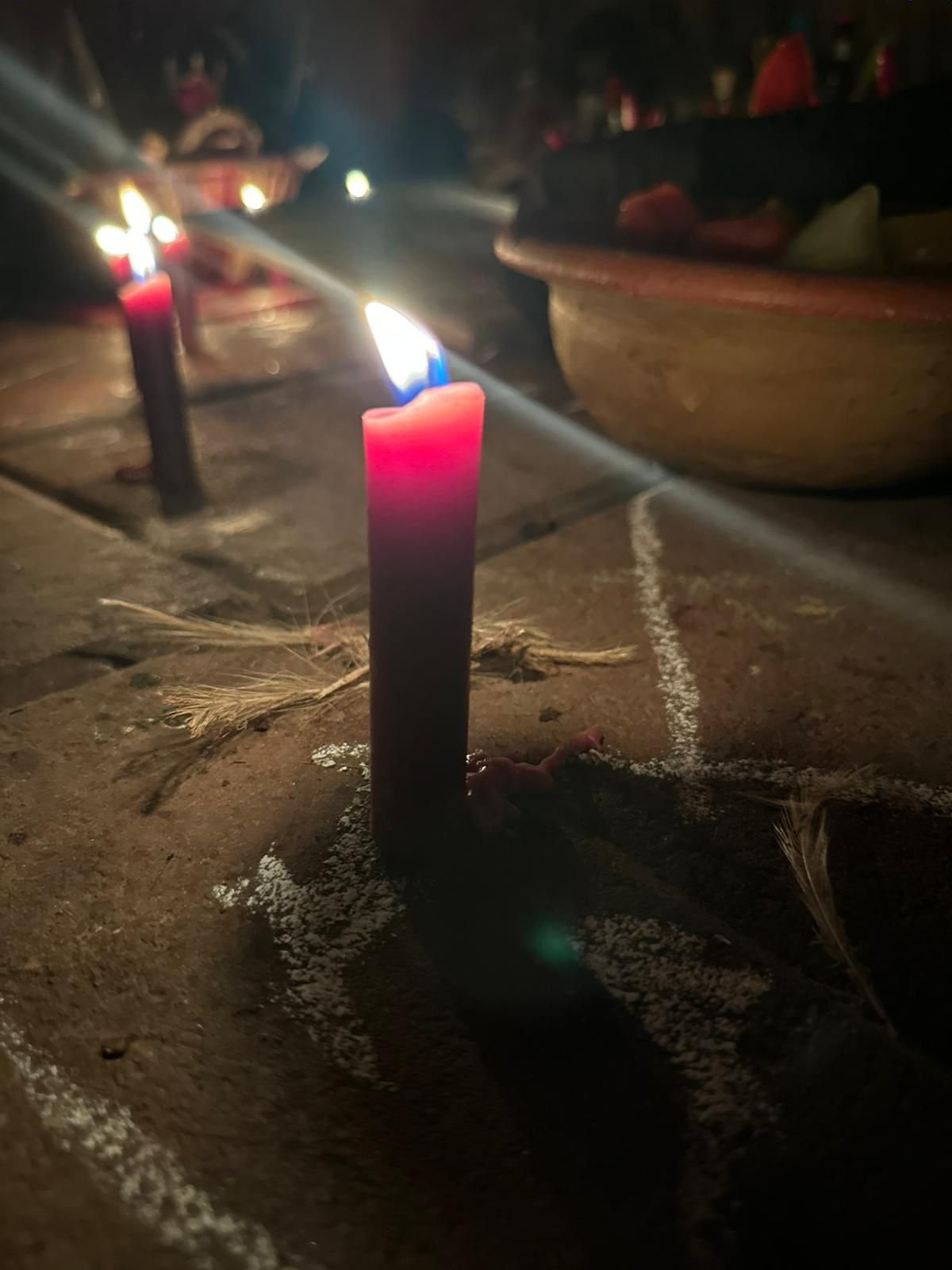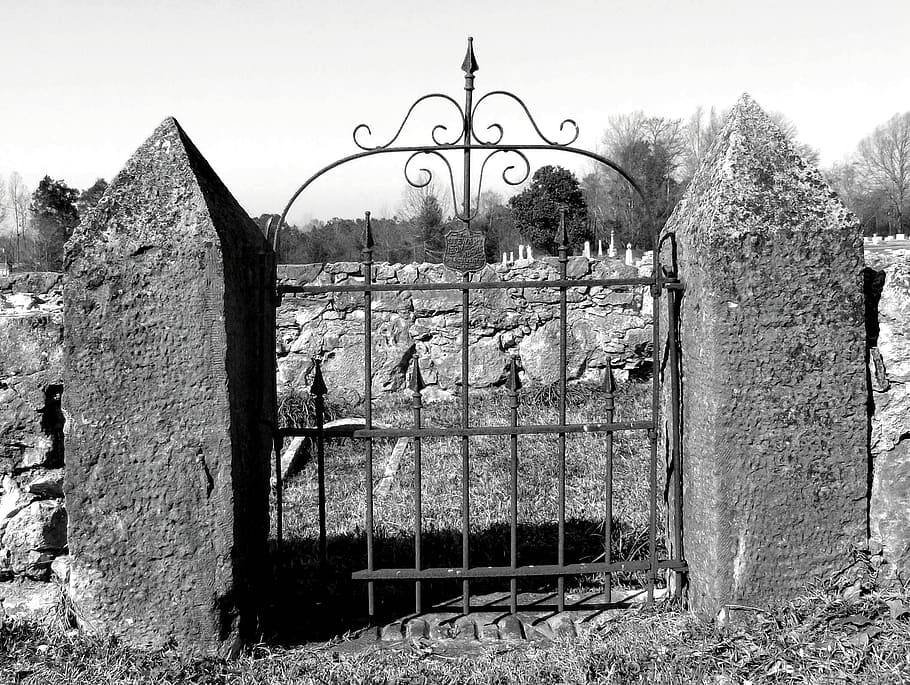
About the Temple
We are a Quimbanda de Raíz Temple, in the Quimbanda de Angola and Kimbanda Kongo lineages. With an emphasis on community, hands-on training, and personal empowerment, the Temple boasts a diverse and dedicated family of initiates. We perform all ceremonies of Quimbanda, including divination, workings, and initiations, and host several semi-public events throughout the year; if you’d like to be notified of such events, join the mailing list.
Tata Apokan
Tata Apokan, Jesse Hathaway Diaz is a folklorist, artist, performer and independent scholar with a Masters in Performance Studies from NYU. With initiations in several forms of witchcraft from Europe and the Americas, he is also a lifelong student of Mexican curanderismo, an initiated priest of Obatalá in the Lucumí Orisha tradition, and a Tatá Kimbanda. He co-hosts an occult themed podcast called ‘Radio Free Golgotha’, and co-edits the ‘Folk Necromancy in Transmission’ imprint through Revelore Press. His artistic and written work navigate the world-as-magic through exploring orality and transmission, decolonialism, ritual theory and praxis, herbalism and healing modalities through private study, apprenticeship, and community involvement. He is the owner of The Pact, an online occult store, and you can also see his other work on his personal site.
He was made a Tata Kimbanda in 2009 in Minas Gerais, Brazil, in the Cabula Mavambo Ngbodi Nzila, also known as O Quarto Vermelho. After a decade of training, Tata Apokan founded the Cabula Mavile Kitula kia Njila in 2019 in New York City. The spiritual house took new form in 2021 when the Temple was established in the Hudson Valley, two hours upriver from New York City in the shadow of the Catskill Mountains. Sitting on five acres of forested land between the Hudson River and the Catskill Escarpment, the Cabula Mavile Kitula kia Njila is the central home to an international community of initiates and students under the guidance and direction of Tata Apokan, and part of a larger community of terreiros, temples and communities in Brazil.
Our Name
Cabula is used as name for a House or Temple, derived from parallel ancestral practices of macumba
Mavile is an avatar of the nkisi Aluvaia-Pambunjila, the Bantu deity of the crossroads.
Kitula is the Kimbundu word for Lily, coming from kitulu, meaning flower.
kia Njila is kimbundu for ‘of the (cross)road’.
Cabula Mavile Kitula kia Njila, The House of Mavile, the Lily of the (Cross)Road
Quimbanda de Angola
The lineage of Quimbanda descended from Jubiabá and Tata Londira is referred to as Quimbanda de Angola by the majority of Quimbandeiros in Brazil. While there is a small minority which refers to it as Quimbanda Nagô, and there are several lineages of Quimbanda Nagô that do resemble ours, we have chosen to use the name of the lineage as most heavily used by others in Brazil. Quimbanda de Angola is a ‘de raiz’ tradition, where Quimbanda is practiced on its own without dependence on the various Candombles, Umbandas, and other traditions that have incorporated what is now referred to as Quimbanda. This means while orixa or other traditions may be practiced in tandem with Quimbanda, we must also understand that Quimbanda de raiz sees Quimbanda as its own authority and not subject to the Law of Umbanda or its spirits viewed as slaves to the orixa, nkisi or vodums.
The Exus and Pombagiras of Quimbanda de Angola are served, worked, and seated in a Congo-Angola manner. We derive our rituals and practices from the Congo-Angola based practices of Tata Londira, Joazinho da Goméia, and his Tata, Jubiabá, Severiano Manoel de Abreu. While rooted in these methodologies and sorceries of the Kimbandas (the healers) of Congo-Angola, Quimbanda (the practice) as we now recognize it is a Brazilian witchcraft which arose through the intermixing of indigenous healing traditions, European heretical magics, and a heavy foundation in Bantu sorcery and the cosmology of the Congo-Angola peoples. Each Temple and each generation of Quimbanda in turn must adapt to the times and location of their practice, still committed to the fire and força of their initiatory lineage, and be of service to the people in their communities.
Quimbanda in the United States
As a Temple rooted in the United States, we remain committed to both holding the landmarks of our lineage and traditions, and to honoring the Brazilian inheritance and cultural context of Quimbanda. While Quimbanda is Afro-Brazilian in origin, all true spirit contact must come from and through the Land beneath our feet, not an idealized mythic homeland. Quimbanda will always wear the body of the land in which it is practiced. Maturation on this road must, by necessity, be guided by resilience and adaptation, not rigidity and calcification.
Local sites of power and native plants and animals, the mythologies and folklore of the area must all inform the Quimbanda we practice. None of this detracts from the beauty of the tradition, rather it reifies the fires of our daily lives as part of our Quimbanda, never apart from it. It is in our ability to adapt to our surroundings that the macumbeiro finds mastery, where Exu and Pombagira work in concert with and celebrate with local spirits and traditions, and dance between where we have been, where we are going, and the choices we make in the crossroads of each moment. We use what we have while remembering our roots, to fight for what we desire. Tradition is always to light new fires, not to smother with ashes. May Exu and Pombagira break through any rigidity that holds us back from accomplishing greatness!
Kimbanda Kongo
In 2024, Tata Apokan was made Tata N’ganga in Kimbanda Kongo by the hands of Mametu N'ganga Emekabande of Cabula Mulemba in São Paulo, Brazil. Kimbanda Kongo is a more ‘Bantu’ expression than many Quimbandas, where initiates work powerful ancestors through the kunda (male assentamento) and panjira (female assentamento), stirring their collective ancestry and ancestors as the foundation of nkisi-based medicines and workings.
Cabula Mulemba, our ndanji in Kimbanda Kongo, is a sister house through our shared Quimbanda de Angola lineage, Cabula Mavila Kitula kia Njila maintains its strong ties with Cabula Mulemba in both lineages. Tata Apokan, known as Tata N’ganga Kilombe wa Lwenzi in Kimbanda Kongo, continues to integrate Kimbanda Kongo and its medicines into the Cabula Mavile Kitula kia Njila, and both systems–Angola and Kongo– are practiced within the Temple to better serve our community of initiates and clients.
Nossa Magia, Nossa Quimbanda, Nossa Cabula
Our Temple is rooted in values of agency, community, reciprocity, medicine, respect, discretion, and responsibility. While Quimbanda notoriously abhors rules, community depends upon them. It is the character of each quimbandeiro that allows their practice to root well in their lives. Quimbanda is volatile, and yet holds great potential for individual transformation and healing. It is not an easy path, but one that we feel is learned better through the mirror of the group. We are a spiritual family of quimbandeiros, working to better each other, working to better the Temple, working to better ourselves. Honoring our foundation, we plant this Fig Tree of Hell in American soil and dance with our spirits, honoring our magic, our quimbanda. Laroyé Exu! Salve Pomba Gira! Salve o bom povo de Quimbanda! N’guzu ê Kimbanda!
Text written by Tata Apokan, Jesse Hathaway Diaz
